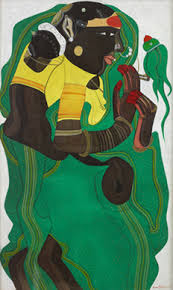Staying in a suburb has its own advantages. Especially if you have a creek at the rear side of the apartment and an Express Highway
Life in the colony was calibrated at regular intervals by religious festivals.
Ganeshotsav for example. Cultural programmes were organized in the evenings which ran late into the night. A man in his mid thirties who stayed in the colony gave a vocal recital. It was the first time I was listening to a live Hindustani concert. The audience had settled themselves on the tarpaulin spread on the ground. There was an unassuming stage near to the illuminated and heavily garlanded idol. The humility of the artist certainly stroked a chord in me. Dressed in spotlessly white kurtha-pyjamas, he remained an austere one-man island unaffected by the surrounding tribulations.
Why wasn’t the gentleman protesting through his music? I asked to myself. He was not begging for alms. He never seemed to be searching for his redeemer either. His music was immersed in a particular bhava - a feeling of loss, perhaps. It created a mood of nostalgia for the past years. Or it might be an expression of ambitions given up. Anyway, he was fulfilling himself through his music and that made him a contended man.
The audience grew in number as the concert progressed. People residing in faraway slums too turned up. Two of them stood at the periphery of the venue wearing only loose underwear, i.e., lined half-pants and baniyans, were hesitant to move forward. Were they untouchables? I didn’t know. The organizers invited them to come to front and sit on the tarpaulin. They did.
I couldn’t figure out the raga. I was unable to keep the timings too. The audience consisting of mostly government servants made gestures with their fingers at most inappropriate times. The vocalist didn’t seem to bother. Afterall, he was an insider. The unknown babu turned Pandit. Tucked under the mundane existence of the ten-to –five grind, the music must have helped him in surviving the sad and savage life around.
I enjoyed the concert.
Shortly afterwards, I went for a rock concert, as a first timer. One of my friends named Jairam accompanied. He always used to keep goli in his trouser pockets to save the procuring time in an emergency. We went for the rock-show Aid Bhopal Concert. The proceeds were to be given away to the victims of Bhopal Gas Leak tragedy. Sitting at the dark corner of Azad maidan, Jairam melted the goli with the help of a lighted matchstick and mixed the substance with tobacco. Inside the stadium the sea of youngsters, mostly college students were raring to go. They had been set on fire by a middle-aged, portly man wearing a goatee (read french-beard) and large sunglasses.
Sincerity is the only thing that matters, I mused after a while. I had seen the documentary “Woodstock

Three hundred thousand young men and women mostly in their early twenties gathered at the wheat-fields ofWoodstock , a place bordering the forests in White Lake, New York for three consecutive days in 1969 and protested against Vietnam War. The comforts were almost nil, not even the basic amenities but nobody complained. Musicians from all over, especially the black, performed without a break. The rains came and nobody ran helter-skelter. Water melons from the far end of the crowd were passed from hand to hand to the artist performing on the stage. He stopped for a while as a thanksgiving gesture to collect the reward.
Three hundred thousand young men and women mostly in their early twenties gathered at the wheat-fields of
This sort of enthusiasm and bonhomie which stem from a deep concern for others do not have a place for exhibitionism. The young crowd didn’t want to impress upon anybody. They were quite spontaneous. Oddly enough, they invited the wrath of the US
